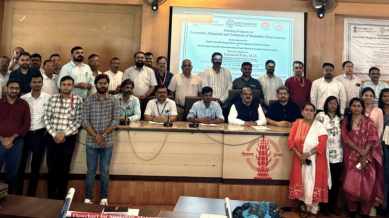Click here to join Express Pune WhatsApp channel and get a curated list of our stories
Over 400 doctors trained to reduce snakebite fatalities in tribal regions of Nashik, Nandurbar districts
Experts have said that the proposal should be expedited to enhance surveillance, enable timely intervention, and ensure an effective public health response.

Snakebite continues to be a key indicator of rural health disparities. The World Health Organization’s (WHO) 2030 goal to reduce snakebite-related deaths and disabilities by half depends on the timely administration of antivenom— within the critical “golden hour.”
However, this responsibility often falls on under-resourced primary health centres in remote areas. Pre-training assessments revealed that many rural doctors lacked the confidence to manage snakebite cases, resulting in unnecessary referrals and preventable deaths.
monthly limit of free stories.
with an Express account.
Now, in a decisive push, the state government has launched a targeted initiative to reduce snakebite fatalities in tribal and rural regions by training medical officers in prevention, diagnosis, and effective treatment of snakebite envenoming.
The Model Rural Health Unit (MRHRU), Vani, Nashik district, in partnership with the state Public Health Department, has trained over 450 medical officers from Nashik and Nandurbar districts. The training programme was held recently under the aegis of the National Action Plan for Prevention and Control of Snakebite Envenoming (NAP-SE) and the sessions were steered by Dr Sadanand Raut,national expert on snakebites, Dr Rahul Gajbhiye, nodal officer, MRHRU, Vani and Scientist E, ICMR-National Institute for Research in Reproductive and Child Health (NIRRCH), and Dr Hrishikesh Munshi, Scientist C, ICMR-NIRRCH, Mumbai.
Dr Raut told The Indian Express that as part of the Mission Zero Snakebite deaths, several areas in and around the northern part of Pune have reduced the number of cases. These areas include Junnar, Ambegaon and leading up to Rajgurunagar, Sangamner and Ahmednagar. “Earlier, we would get a lot of cases from these areas. Now after training medical officers at PHCs and creating awareness, there has been a definite reduction in the number of snakebite cases from these areas. We have helped reduce the bite- to-needle time in snakebite cases,” said Dr Raut who has saved well over 12,000 lives in the last two decades.
According to data available with the Union Health Ministry, in India, around 50,000 deaths occur of an estimated 3-4 million snakebites annually which accounts for half of all snakebite deaths globally.
According to experts,venomous snake bites can result in medical issues which can be deadly or lead to permanent impairment if timely and appropriate treatment is not given. Dr Raut, who is also a member of WHO’s Roster of Snakebite Experts, demonstrated rapid assessment, timely antivenom dosing, and the avoidance of harmful first aid procedures during the training sessions and shared his experience of managing complex cases of snakebite envenoming. Dr Geetanjali Sachdeva,Director of ICMR-NIRRCH, Sawan Kumar, CEO, ZP, Nandurbar, Dr Kapil Aher, Deputy Director of Health Services, Nashik division and others played a crucial role for the intensive training programme
Maharashtra should expedite proposal to declare snakebite a notifiable disease
The proposal to declare snakebite a notifiable disease in Maharashtra is currently under review by the Maharashtra Public Health Department. Experts have said that the proposal should be expedited to enhance surveillance, enable timely intervention, and ensure an effective public health response.
Dr. Gajbhiye has been a strong advocate for declaring snakebite a notifiable disease in India. In response to ongoing efforts, on November 27, 2024, the Secretary of the Union Ministry of Health and Family Welfare, issued a letter to the health secretaries of all states and Union Territories, requesting that snakebite cases and deaths be made notifiable under the relevant provisions of the respective state public health acts. This directive mandates all government and private healthcare facilities to report snakebite cases and deaths.
Click here to join Express Pune WhatsApp channel and get a curated list of our stories